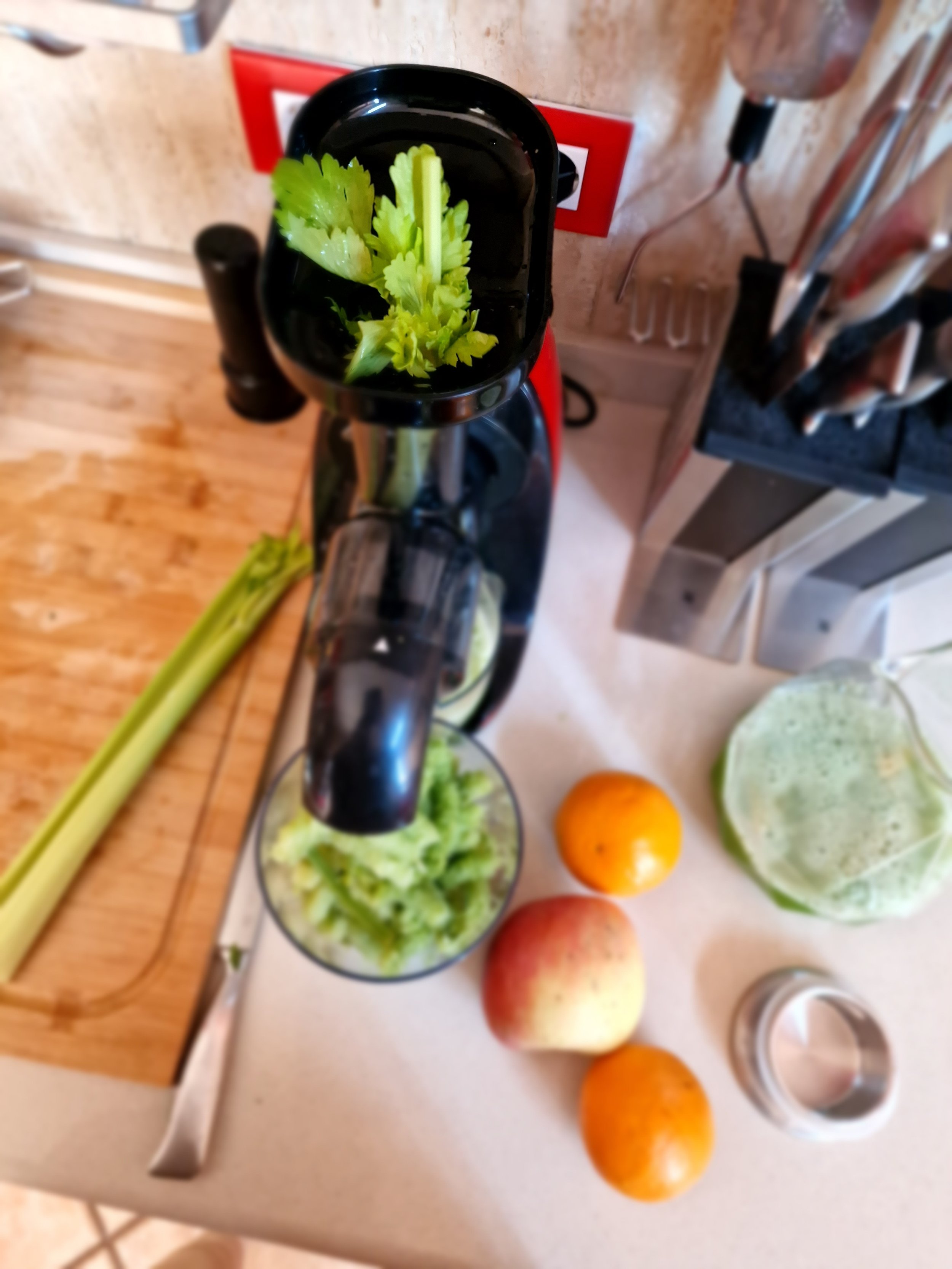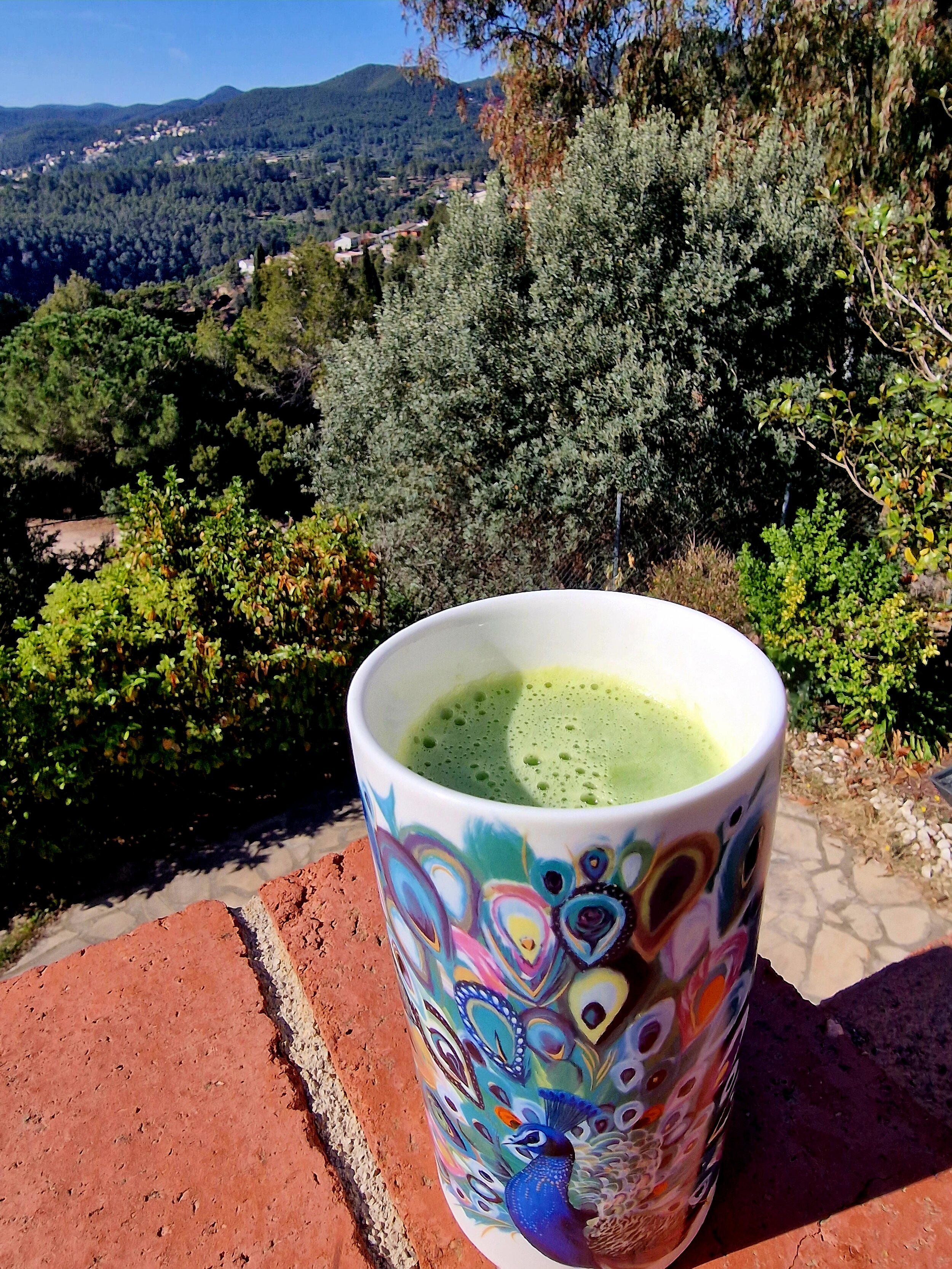Celery mornings
A few weeks ago when I set myself on getting out of chronic fatigue, I started ditching the coffee and oolong tea for celery juice to start the day. And now I have more sustainable calm energy throughout the day.
I wrote about the whole story of chronic fatigue and solutions in this other blog post: Tired of Being Tired. But now I’m going to zoom in on the celery juice morning practice.
Celery juice has gained considerable attention in recent years, particularly in the realm of wellness and healthy living. This refreshing, green beverage is packed with vitamins, minerals, and phytonutrients that can offer various health benefits. In this article, I will explore the nutritional content of celery juice, its health benefits, and potential risks. I will also share a delicious recipe to help you incorporate this nutritious drink into your daily routine.
Health Benefits of celery juice
1. Hydrating and alkalinizing
Celery juice helps you start the day with an alkalinizing and super-hydrating juice packed with nutrients.
I wrote about why it’s important to keep a balanced pH in this article. In short, an acidic body pH is bad for health, as that’s an environment in which bacteria, viruses, parasites, and hence diseases, are thriving. If we eat foods that increase acidity, like animal products, but also the morning coffee, we are basically inviting problems in. Starting your day with an alkalinizing juice like celery juice is a better way to start the day.
Then we all know hydration is important. But hydration is not just achieved by drinking water, but by having the minerals in the water. You’ve probably heard of electrolytes before. These are things like sodium, potassium, and calcium, which are minerals needed in hundreds of cellular functions. And celery has plenty of these minerals, in very easily absorbable forms, and many more.
Here is what a full celery plant (approx 500g) that you use for a couple of cups of juice will bring you in terms of nutritional elements, according to nutritionvalue.org:
In terms of hydration, celery juice also has a high water content, making it an excellent choice for staying hydrated.
Adequate hydration is crucial for maintaining healthy skin, digestion, and overall health.
2. Antioxidant
Celery juice is packed with antioxidants that protect your cells from damage.
Celery juice is rich in antioxidants, such as vitamin C and flavonoids. These powerful compounds neutralize free radicals, unstable molecules that can cause oxidative stress and cellular damage. Consuming antioxidant-rich foods and beverages like celery juice can help protect against oxidative stress, which has been linked to chronic diseases, aging, and inflammation.
3. Anti-inflammatory
Celery juice is anti-inflammatory, making it a great way to start the day without brain fog.
Inflammation is a natural immune response but can become harmful when it persists over time. Chronic inflammation has been associated with numerous health conditions, including heart disease, diabetes, and autoimmune disorders. Celery juice contains various phytonutrients, including luteolin and apigenin, which have demonstrated anti-inflammatory properties. Consuming celery juice may help reduce inflammation and support overall health by providing these beneficial compounds.
4. Good for digestion
Celery juice helps with digestion and it’s a great way to have it as first thing in the morning.
Although celery juice does not contain significant amounts of fiber due to the juicing process, it still offers some benefits for digestive health. Celery juice has been claimed to support liver health by encouraging the production of bile, which aids in the digestion and absorption of fats. Additionally, the high water content in celery juice can help maintain proper hydration, which is essential for healthy digestion and regular bowel movements.
5. Good for hormonal balance and fatigue reducing
Celery juice helps the adrenal glands and the stress and sex hormones it produces to stay in balance.
The adrenals are the ones that produce:
cortisol (in charge of the body’s stress response, metabolism management, immune response, inflammation management, sugar balance, and the handling of fats, proteins, and carbs)
adrenaline (in charge of the body’s fight-or-flight response, and which increases blood pressure when needed)
sex hormones as a secondary source before menopause and a primary source after menopause, and the production of DHEA which turns into estrogen and testosterone
Some examples of these hormones not being in balance are:
High cortisol lowers estrogen levels in women, which results in mood swings, more fat deposits, sleep problems, infertility issues, etc.
High cortisol lowers estrogen for men too, causing more fat in the belly area, weakening of bones, lower sex drive, etc.
High cortisol makes the skin produce more sebum, which often leads to acne.
High cortisol leads to headaches, irritability, and reduced brain function.
High cortisol leads to weight gain, weaker muscles, and weaker bones.
Nobody wants that, right?
But life is full of stressful events, and the caffeine we all reach out to for energy is actually increasing cortisol, and hence accentuates our reaction to stress rather than calming us.
Beyond just hormonal imbalance, the adrenal glands can go into adrenal fatigue.
Adrenal fatigue is a term used to describe a collection of non-specific symptoms, such as fatigue, nervousness, body aches, and sleep disturbances, attributed to the supposed underperformance of the adrenal glands. However, it is essential to note that adrenal fatigue is not a recognized medical diagnosis, and many healthcare professionals and experts dispute its existence.
That being said, celery juice has been promoted by some as a potential remedy for adrenal fatigue, mainly because it is believed to offer various health benefits that may help alleviate some of the symptoms associated with this controversial condition.
Some reasons people claim celery juice may help with adrenal fatigue include:
Hydration: Since proper hydration is crucial for overall health and energy levels, the high water content in celery juice can help maintain proper hydration, which may alleviate some symptoms of fatigue and tiredness.
Electrolytes: Celery juice is a source of essential electrolytes, such as potassium and sodium, which play vital roles in maintaining fluid balance and supporting adrenal function. An imbalance of electrolytes may contribute to fatigue and other symptoms related to adrenal function.
Vitamin C: Celery juice contains vitamin C, an antioxidant that plays a role in the production of cortisol, a hormone released by the adrenal glands in response to stress. Adequate vitamin C intake is essential for adrenal health, and some proponents of adrenal fatigue theory suggest that increasing vitamin C intake may support adrenal function and reduce fatigue.
Anti-inflammatory properties: As mentioned earlier, celery juice contains compounds with anti-inflammatory properties, such as luteolin and apigenin. If adrenal fatigue is linked to chronic inflammation, consuming anti-inflammatory foods and beverages like celery juice may help alleviate some symptoms.
It is crucial to recognize that the connection between celery juice and adrenal fatigue is mainly speculative and lacks solid scientific evidence. Additionally, because adrenal fatigue is not an officially recognized medical condition, it is essential to consult with a healthcare professional if you are experiencing persistent fatigue or other symptoms that may be indicative of an underlying health issue.
6. Fights against common Epstein-Barr Virus
Celery juice helps put the energy-consuming and silent Epstein-Barr Virus in check.
Epstein-Barr is a very common virus (it’s said that more than 90% of people have it) that causes fatigue and many chronic diseases over time. It usually stays inactive, but stress or hormonal changes can reactivate it, and it wreaks havoc in the body. EBV infection can lead to various health conditions, such as infectious mononucleosis (mono), and has been associated with an increased risk of certain autoimmune diseases and cancers.
Celery juice supports the immune system and brings useful vitamins and minerals. Vitamin C is especially helpful with the Epstein-Barr virus, and adding lemon or orange juice to the celery juice is a plus, and it also improves the taste.
In general, celery is antibacterial, antiviral, and anti-inflammatory, due to its active compound apigenin.
Got facts?
There’s been a lot of debate online if celery juice is really worthy, or if it’s just an Instagram trend. So here are some medical and research resources to dive into for more concrete facts:
A review of antioxidant activity of celery - National Library of Medicine
A pilot study to evaluate the antihypertensive effect of a celery extract - Natural Medicine Journal
Diuretic effect on combination of celery herb and bay leaf - Scientific Net
Breast cancer effectively treated with chemical found in celery, parsley - University of Missouri
Study of hypoglycemic activity of celery herb extract - Journal of Pure Applied Microbiology
EBV reactivation as a target of luteolin - National Library of Medicine
The therapeutic potential of apigenin - National Library of Medicine
Risks of celery juice
Celery increases your sun sensitivity, and it can create skin problems if you are sunbathing when having your celery juice.
Celery contains psoralens, a group of naturally occurring compounds that can cause increased sensitivity to sunlight, also known as photosensitivity. Consuming large amounts of celery juice may increase your risk of sunburn or other skin reactions when exposed to sunlight, especially in people with fair skin.
To mitigate this, you could simply avoid sun exposure, or take some supplements that protect you from sun damage. I personally take bilberry and nordic pine bark supplement from Vegavero.
Also, high amounts of celery (or anything really) can also increase toxicity in the body. Food is medicine after all, and everything in high quantities can have a detrimental effect.
Therefore, I recommend only having it as a one-month, up to three months daily routine, with one or two days break per week.
Bonus if you match that with the high season of it in your region, so you benefit more from eating fresh seasonal foods. In the region where I am in Spain, celery is popular in spring, and I get a fresh delivery of it twice a week at the moment from a farmer nearby.
Additionally, note that celery is part of the "dirty dozen" list of fruits and vegetables with the highest pesticide residues. To minimize exposure to pesticides, choose organic celery when possible.
Taste boosters for celery juice
I personally dislike the taste of celery juice. So I’m adding some other fruits and vegetables that help with the same health benefits, and boost the taste so much that it actually becomes very yummy.
My additions to celery juice are lemons or oranges, apples, and cucumbers.
I always drink it fresh, right after making it, and I’m dealing with cleaning the juicer machine afterward.
Btw, if you want a juicer recommendation that is cost-effective, works really well for celery, apples, cucumbers, and citrus, and also can be cleaned in less than a minute, you can try the one I use, purchased from Amazon.
Come enjoy a detox retreat in nature
If you want to enjoy your celery juice with such beautiful green views as in the photo below, learn more about other detox methods, and invest in your holistic health, check out Barcelona Health Club retreats.
Alternatively, stay in touch via the newsletter form below:







